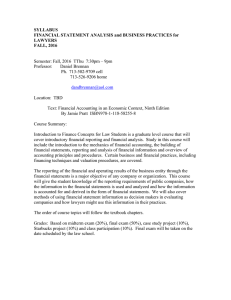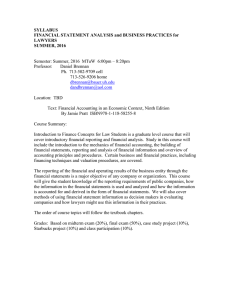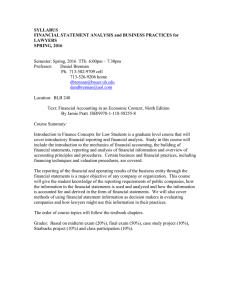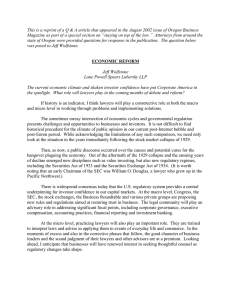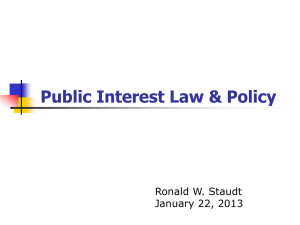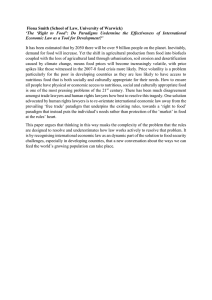Instructions for Writing Simulation Assessment Papers John Lande
advertisement
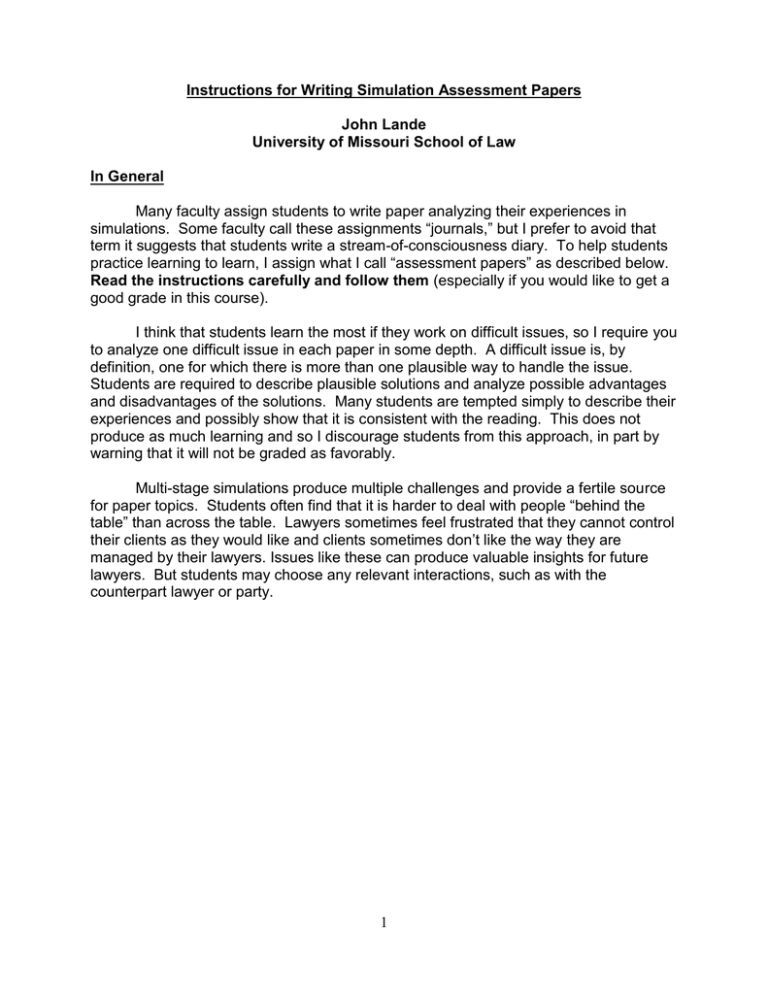
Instructions for Writing Simulation Assessment Papers John Lande University of Missouri School of Law In General Many faculty assign students to write paper analyzing their experiences in simulations. Some faculty call these assignments “journals,” but I prefer to avoid that term it suggests that students write a stream-of-consciousness diary. To help students practice learning to learn, I assign what I call “assessment papers” as described below. Read the instructions carefully and follow them (especially if you would like to get a good grade in this course). I think that students learn the most if they work on difficult issues, so I require you to analyze one difficult issue in each paper in some depth. A difficult issue is, by definition, one for which there is more than one plausible way to handle the issue. Students are required to describe plausible solutions and analyze possible advantages and disadvantages of the solutions. Many students are tempted simply to describe their experiences and possibly show that it is consistent with the reading. This does not produce as much learning and so I discourage students from this approach, in part by warning that it will not be graded as favorably. Multi-stage simulations produce multiple challenges and provide a fertile source for paper topics. Students often find that it is harder to deal with people “behind the table” than across the table. Lawyers sometimes feel frustrated that they cannot control their clients as they would like and clients sometimes don’t like the way they are managed by their lawyers. Issues like these can produce valuable insights for future lawyers. But students may choose any relevant interactions, such as with the counterpart lawyer or party. 1 Detailed Instructions The main purposes of your assessment papers are for you to: (1) learn about handling difficult issues, and (2) practice analyzing lawyers’ work, an important process in developing your professional skills. ! Focus on only one challenging and important issue about dispute resolution or lawyering and discuss it in depth. Your assessment must relate to a single dispute resolution or lawyering issue arising in a simulation that is challenging (i.e., where there is more than one plausible way to handle the issue) and important (i.e., that arise frequently and/or could have major consequences). To provide an analysis in depth, support your conclusions as described below. ! To decide what to write about, you might consider issues from the course readings or other literature. Examples of suitable issues include maintaining appropriate relationships with clients and/or counterpart lawyers, managing expectations, dealing with difficult emotions, developing trust, managing an exchange of apologies, managing client participation in negotiation, and choosing a negotiation approach. These are just examples and you may choose other issues. ! At the beginning of your paper, clearly identify the issue you will analyze and focus the rest of the paper exclusively on that issue. Start by describing the relevant interactions and why you had a dilemma, i.e., why there was no obviously best solution to the problem. ! You may refer to any stage(s) of the simulation. You are not limited to analyzing only the final negotiation. You may refer to several stages if they relate to the issue you are focusing on. ! Describe only relevant facts. I know the fact pattern, so don’t repeat most facts or tell everything that happened in your case. Instead, describe only the interactions that are relevant to the issue in your paper, including enough detail to give me a good understanding of the dilemma. ! You may analyze several instances of the same issue (such as developing trust). This is still considered as one issue. ! If you played a client, use that experience to analyze lawyering techniques that may or may not work well in challenging situations. ! Normally, papers should focus on your own interactions. You may focus on others’ interactions (such as interactions between the lawyer and party on the other side) if they seemed particularly challenging and/or your interactions did not seem particularly challenging. 2 ! ! Although the paper should focus on lawyering techniques generally, you may include discussion of how your own personality, habits, views etc. affected what happened and what you might do as a lawyer in similar situations. ! Although this assignment particularly lends itself to interactions that were problematic, you may analyze interactions that worked well. In these situations, discuss why they worked well and other possible approaches. Even if there was a good result, the lawyers’ approaches may not necessarily have been wise and there may have been better approaches. ! You may use the first person voice. Your discussion must describe plausible options for lawyers in handling the problem, including potential benefits and risks of those options. In other words, discuss what else might have been done and what would have been the likely effects. Papers that explain only why certain interactions worked well or not (sometimes merely applying a prescription from the readings or class discussion) are not as good as papers that also analyze alternative options for handling the interactions and develop good strategies. ! There is no single “right” answer. If you have selected a challenging issue, there should be no single right answer. (Of course, some statements may be problematic or incorrect and you should obviously try to avoid making such statements.) ! The analysis must describe how your experience affects your thinking about handling similar problems in the future. Of course, you won’t encounter the exact same situation in the future, considering differences in parties, lawyers, facts, legal issues, etc. So any lessons for the future necessarily should be qualified. In other words, you shouldn’t say that you will “always” or “never” do something in the future based on a single experience. It is more useful to think in terms of things like “warning signs,” options to consider in similar situations, and factors affecting the approach you might choose, etc. ! Summary. Here is a list of approaches, ranked from worst to best: ! ! ! ! ! ! Describe what happened without focusing on a challenging issue Describe what happened, focusing on a challenging issue Show that the interactions were consistent with some theory Analyze why the interactions were challenging Mention alternative approaches that lawyers might have used Describe alternative approaches that lawyers might have used and analyze risks and potential benefits of each approach Papers will be graded accordingly. 3 ! Support Your Conclusions. Specifically describe the interactions and the reasoning supporting your conclusions rather making than unsupported conclusions. For example, if you think that a particular negotiation approach was ineffective, describe the specific circumstances that lead to your conclusion. ! Most important are the quality of your analysis and whether it plausibly supports your suggestions for producing good results. Similar to a legal brief, where the legal analysis is more important than the factual account, the analysis of lawyers’ options is the most important element. ! Be Candid. Experienced lawyers don’t always perform as well as they want and law students don’t either. This is normal when dealing with challenging issues. You can learn a lot from things that don’t go well. So don’t pretend that you (or your classmates) performed better than you think you actually did. You will receive a better grade for a candid and insightful analysis of problems than for a superficial presentation that avoids discussion of problems. ! Selectively Include Useful Citations. You can strengthen your paper by briefly relating the analysis of your case to relevant theory or other material from assigned readings or other sources. You may also refer to class discussion as appropriate. Remember, however, that the main purpose of this paper is to stimulate your analysis, not summarize others’ views. ! Use Good Writing Techniques. Generally follow the “suggestions for writing” posted in the syllabus section on TWEN. Although grammatical and citation errors will not affect your grade, you should get in the habit of proofreading your writing so that it reflects well on you. ! Review These Instructions After Writing a Draft. Many papers do not follow the instructions and are not as good as they might be (and, as a result, do not get as good grades as possible). In practice, lawyers should review the rules and/or their instructions before transmitting documents. Similarly, you should review these instructions before submitting your paper. ! If You Have Questions about What You Are Supposed to Do, Ask Me. I encourage students to ask questions in class because if you have a question, it is likely that other students have the same question. I am also happy to talk with students individually outside of class. Feel free to set up an appointment or ask questions by email. 4

